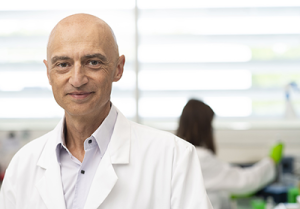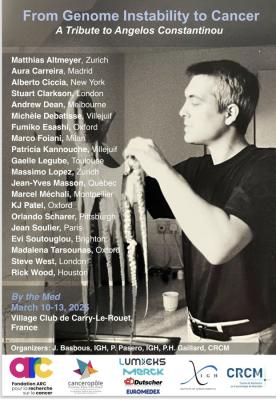
Giacomo Cavalli has just been appointed member of the Academy of Sciences for his scientific contributions in the field of epigenetics and genomics.
Giacomo Cavalli has been interested in chromatin since his thesis at the Swiss Federal Institute of Technology Zurich (ETHZ). During his postdoctoral work, he made a discovery on epigenetic inheritance, after which he was recruited to the CNRS, where he set up an junior (Atip) team at the IGH. In 2008, he was elected member of the EMBO and became director of the IGH from 2011 to 2014.
What is epigenetic inheritance? There is heredity of traits that depends on the DNA sequence, our genetic text, and there is another form of heritability, epigenetic heredity, which does not strictly depend on the DNA sequence. It involves proteins and RNAs that interact with the DNA or histones of our chromosomes, modifying the activity of genes without changing their sequence. In his early post-doctoral work, Giacomo Cavalli discovered that the proteins Polycomb and Trithorax, known to play a major role in early embryonic development, allow the transmission of an epigenetic memory, of silent or active chromatin, throughout cell divisions as well as to subsequent generations. His work thus provided a proof of concept for trans-generational inheritance of gene expression with phenotypic consequences in metazoans.
By continuing his work at the IGH, thanks to a dynamic research team rich in young talents, creative researchers and competent technical staff, he demonstrates that the spatial organization of genes in the cell nucleus can mediate epigenetic inheritance across generations. By modifying this spatial organization, he shows that alternative 3D chromatin organizations lead to stable heredity of alternative functional states, in the absence of DNA mutations. The Cavalli team also demonstrates how Polycomb proteins get recruited to their targets and also identifies a major role for Polycomb proteins in cancer.
There is a second area of research where Giacomo Cavalli made an outstanding contribution, and that is the architecture of our genome. Here, the Cavalli team has developed a subtle combination of advanced imaging techniques, molecular and genomic methods, and high-level bioinformatics. This combination allowed them to identify the existence of chromosomal domains characterized by sharp boundaries, with the net effect to promote chromatin interactions within, rather than between different domains. The Cavalli team thus produced the first high-resolution 3D organization of the Drosophila melanogaster genome and the existence of architectural genomic domains is confirmed in mouse, human and many other animal and plant species, and they are now called topologically associating domains or TADs.
Giacomo Cavalli continued his work using mouse embryonic stem (mES) cells as well as neural precursors and cortical neurons obtained by differentiation of mES cells. The Cavalli team demonstrated how TADs are modulated and how chromatin loops connecting genes with their regulatory sequences are dynamically regulated during cell differentiation. They also showed that cell senescence reprograms the 3D genome organization and, by integrating superresolution microscopy techniques, that TADs are plastic and are in turn subdivided into "chromatin nanodomains" of sizes ranging between 100 to 200 kilobases of DNA. Interestingly, these sizes correspond to the average size of mammalian gene landscapes and to the average size of replication domains, thus providing a correlation between the structural organization of chromatin and the “replicon” concept proposed originally by François Jacob and Sydney Brenner.
Giacomo Cavalli is the recipient of two ERC Advanced Grants. His research led to several awards, including the quadrennial Paul Doistau-Émile Blutet Grand Prix, the CNRS Silver Medal, the Allianz Foundation Prize and the 2020 Grand Prix of the Foundation for Medical Research. He has been actively involved internationally in the European network of excellence EpiGeneSys and more recently in the LifeTime initiative and has contributed to scientific communication by organizing several workshops and international conferences at the highest level.



